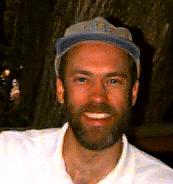Gordon Rowland
 |
I think in particular ways because of what I have experienced and who I have become, so in addition to a formal resume, I'll offer a brief life story. I grew up on a small farm in New England. We were rich in many ways, but not in terms of money. There I learned about life and death, about cycles and systems, and about making do with whatever resources were available. I learned to work and to make things. I learned to value individual and group accomplishment and about the importance of community. I learned that I had talents and an intellect that could be channeled in creative directions. |
|
In high school I turned my mathematical abilities and love of water toward naval engineering. I drew plans for underwater vessels and dreamed of piloting them to the depths of the ocean. But taking a silly fall from a diving board I damaged an ear drum and have been unable to bear more than a little underwater pressure since. The thought of building crafts that I wouldn't be able to pilot myself was unattractive. Other factors intervened as well, and I turned my studies toward another love, music. Rather than accept the enginneering scholarships and appointments, I entered the University of Connecticut and practiced playing the tenor saxophone. I had no previous lessons but somehow convinced the faculty that I had promise and was accepted after a term. Three years later I did my recital to earn a bachelors degree in music performance. I completed nearly all the coursework for a music education degree and studied composition as well. The underlying math fascinated me, so I went on to complete a masters of music theory at Ithaca College. After a rather random series of jobs--everything from stacking shelves to precision assembly--I took a position teaching aural skills and music theory at . I was frustrated that the class exercises would typically reach a small number of students. Whatever I chose would be too hard for some and too easy for others. This was the early 1980s when microcomputers were coming out, and a colleague and I developed a computer-based instruction (CBI) laboratory in order to individualize instruction. This was very successful, and piqued my interest in developing systems that would help people learn. I went on to a doctoral program in . My initial interest in CBI was soon expanded to a range of areas having to do with human learning and performance, so six years later when I completed the degree I sought opportunities that would cross boundaries rather than a position in strictly instructional technology. I also wanted to continue teaching at the undergraduate level, even though the unfortunate consequence is a heavy teaching load. (Why is it that our institutions reduce the load for those teaching advanced students who need less guidance? Seems backward to me.) I've now been at Ithaca College for 14 years teaching in an interdisciplinary program called . If you flip the words around, it's easy to understand: our students learn to design the systems and strategies that people in organizations use to communicate and learn. So, everything from training and instructional design, to media production, to corporate communication. I now chair the department and teach classes in our Learning and Performance area, as well as core and capstone courses in the undergraduate and graduate (masters) programs. I have been able to maintain a modest research agenda regarding design processes, design education, and the nature of learning experience, and this work has been recognized a number of times by professional associations. I was thrilled when my book "A Tripartite Seed: The Future Creating Capacity of Designing, Learning, and Systems" (Hampton Press) was given the 2001 Outstanding Book in the Field of Instructional Development" award by the Division of Design and Development of the . In October 2000 I met Jan and Yusra Visser at an AECT conference and learned we had much common interest in the concept of learning, and it has been a joy collaborating with them since. What question is more basic, yet more trapped by unchallenged assumptions, than the nature of human learning? Over the past decade my interests in systems science and design have grown, also, and have shifted from instruction and education to social systems in general, mostly through my association with the . I've done some work that others might think original, but my own feeling is that I've mostly served as a "translator" and have attempted to make the scholarly work of others available to broader audiences. For example, I've drafted two books that attempt to help young people learn about systems design. One is an allegory--a science fiction novel--and the other is a version of Bela Banathy's recent book on conscious evolution. My graduate student Chris Gonzales and I have transformed the latter into a web site, and we plan to have that online very soon. |
|